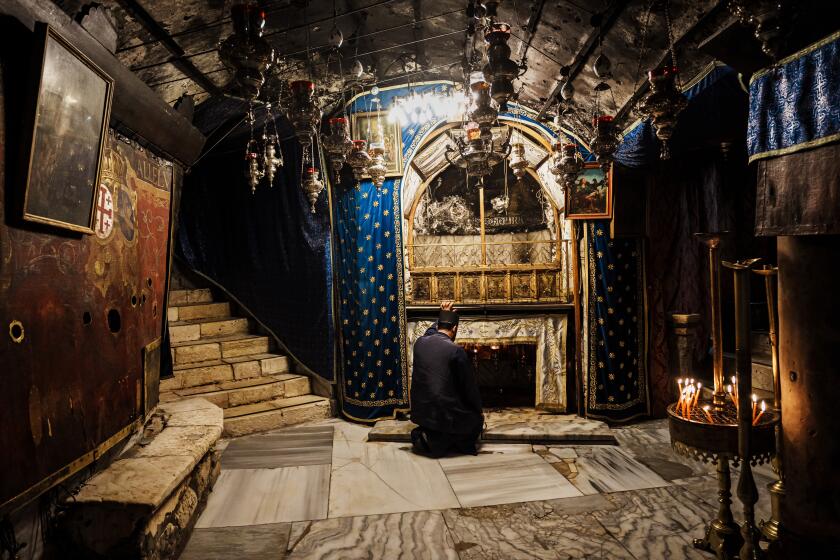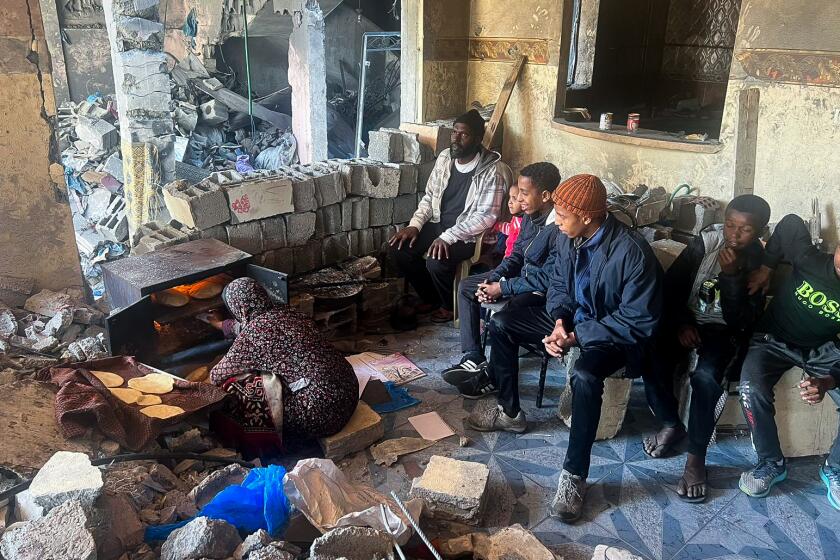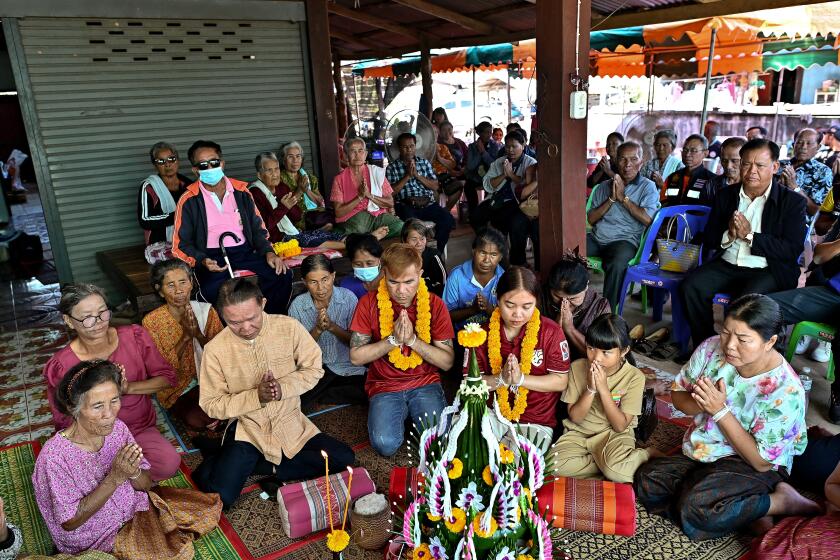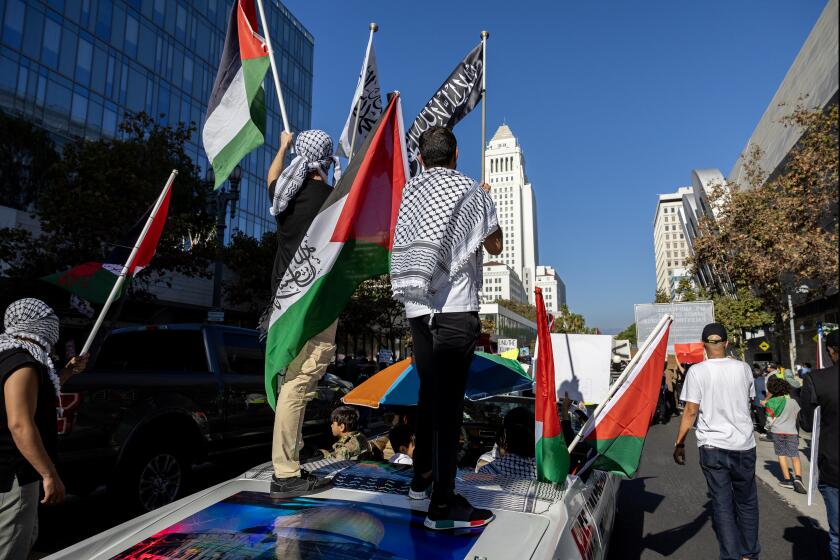Gaza death toll exceeds 20,000 as Israel expands ground war against Hamas
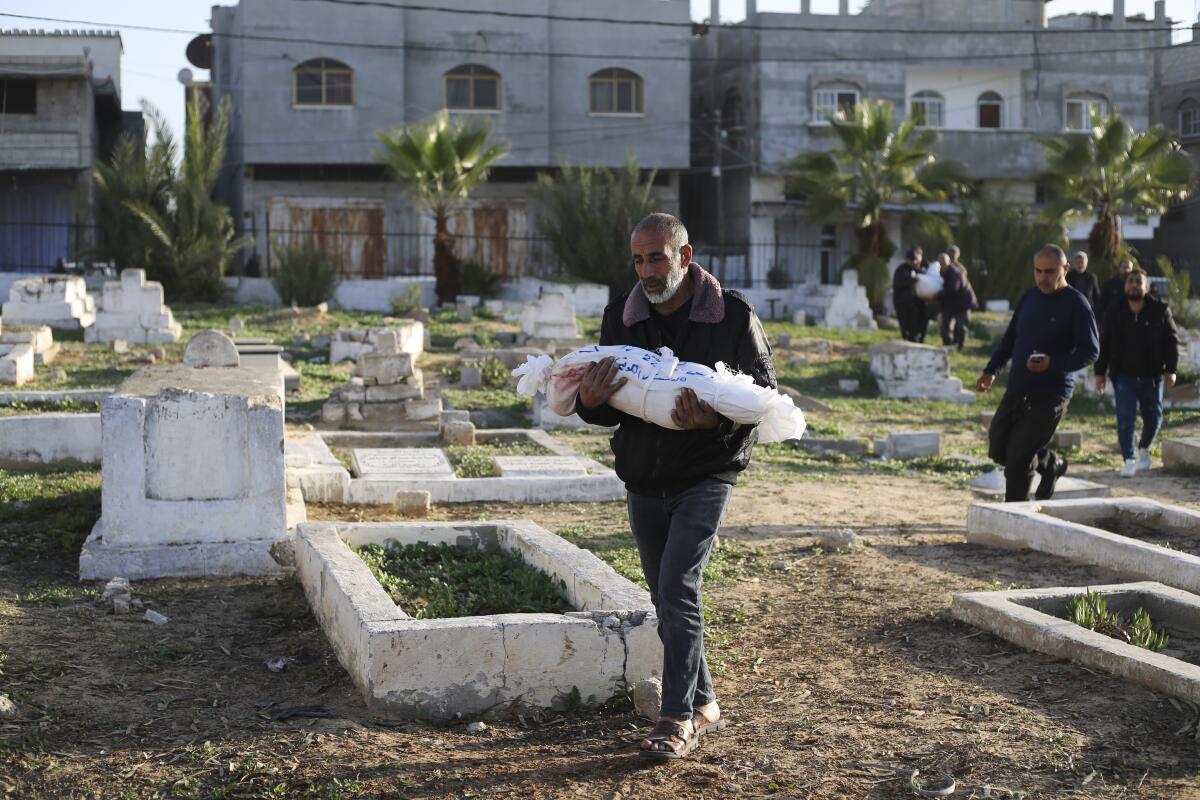
RAFAH, Gaza Strip — Israel’s war to destroy Hamas has killed more than 20,000 Palestinians, health officials in Gaza said Friday, as Israel expanded its offensive and ordered tens of thousands more people to leave their homes.
The deaths amount to nearly 1% of the territory’s prewar population — the latest indication of the 11-week-old conflict’s staggering human toll.
Israel’s aerial and ground offensive has been one of the most devastating military campaigns in modern history, displacing nearly 85% of Gaza’s 2.3 million people and leveling wide swaths of the tiny coastal enclave. And more than half a million people in Gaza — a quarter of the population — are starving, according to a report Thursday from the United Nations and other agencies.
Israel declared war after Hamas’ Oct. 7 attack, in which militants from Gaza stormed into southern Israel, killing some 1,200 people and taking some 240 hostages. Israel has vowed to keep up the fight until Hamas is destroyed and removed from power in Gaza and all the hostages are freed.
After many delays, the U.N. Security Council adopted a watered-down resolution Friday calling for immediately speeding up aid deliveries to desperate civilians in Gaza.
After delays, the U.N. Security Council adopts a watered-down resolution calling for immediately speeding up aid deliveries to civilians in Gaza.
The United States won the removal of a tougher call for an “urgent suspension of hostilities” between Israel and Hamas. It abstained in the vote, as did Russia, which wanted the stronger language. The resolution was the first on the war to make it through the council after the U.S. vetoed two earlier ones calling for humanitarian pauses and a full cease-fire.
Martin Griffiths, the U.N. humanitarian affairs chief, lamented the world’s inaction.
In Bethlehem, the West Bank town revered as Jesus’ birthplace, Christmas is all but canceled, in solidarity with Palestinians’ suffering in Gaza.
“That such a brutal conflict has been allowed to continue and for this long — despite the widespread condemnation, the physical and mental toll and the massive destruction — is an indelible stain on our collective conscience,” he wrote on the social media platform X, formerly Twitter.
Israel vows to keep up pressure on Hamas
Israel, shielded by the United States, has resisted international pressure to scale back its offensive and has said it would press on until Hamas, the militant group that has ruled Gaza for 16 years, has been destroyed.
The military has said that months of fighting lie ahead in southern Gaza, an area packed with the vast majority of the enclave’s 2.3 million people, many of whom were ordered to flee combat in the north earlier in the war.
Evacuation orders have pushed displaced civilians into ever-smaller areas of the south as troops focus on the city of Khan Yunis, Gaza’s second-largest.
‘I just don’t know where we’ll go.’ It’s a question Palestinians ask over and over in Gaza as Israel ramps up bombardment after Hamas truce collapsed.
The military said late Thursday that it is sending more ground forces, including combat engineers, to Khan Yunis to target Hamas militants above ground and in tunnels.
On Friday, it ordered tens of thousands of residents to leave their homes in Burej, an urban refugee camp, and surrounding communities, also in the south.
In the city of Rafah, on the border with Egypt, an airstrike on a house killed six people, according to Associated Press journalists who saw the bodies at a hospital. Among the dead were a blind man, his wife and their 4-month-old child, said the infant’s grandfather, Anwar Dhair.
Rafah is one of the few places in Gaza not under evacuation orders, but it has been targeted in Israeli strikes almost every day.
The air and ground attacks also continued in the north, even as Israel says it is in the final stages of clearing out Hamas militants there.
Mustafa Abu Taha, a Palestinian farm worker, said many areas of his hard-hit Gaza City neighborhood of Shijaiyah have become inaccessible because of massive destruction from airstrikes.
“They are hitting anything moving,” he said of Israeli forces.
For a Thai farmworker taken hostage by Hamas militants Oct. 7, memories of Israel and Gaza are of love, grief and heartbreak for those she left behind.
Rising death toll and hunger
Gaza’s Health Ministry said Friday that it has documented 20,057 deaths in the fighting and more than 50,000 wounded. It does not differentiate between combatant and civilian deaths. It has previously said that roughly two-thirds of the dead were women or minors.
Israel blames Hamas for the high civilian death toll during its intense air and ground attacks, citing the group’s use of crowded residential areas for military purposes and its tunnels under urban areas.
Israel’s military says 139 of its soldiers have been killed in the ground offensive. It says it has killed thousands of Hamas militants, including about 2,000 in the last three weeks, but it has not presented any evidence to back up the claim.
‘Who will we be when we rise from the ashes and reenter our lives?’ Israeli novelists, filmmakers and TV writers are wondering how to tell the story of the Oct. 7 attacks and the war that followed
For most of the war, Israel also stopped entry of food, water, fuel and other supplies except for truck convoys of aid from Egypt, which cover only a fraction of the needs in Gaza.
Because of insufficient aid entering Gaza, the extent of starvation eclipsed even the near-famines of recent years in Afghanistan and Yemen, according to Thursday’s report.
Israel opened the Kerem Shalom crossing several days ago amid international demands to increase the flow of aid. But the military on Thursday struck the Palestinian side of the crossing, killing four staffers, and the U.N. said it was unable to pick up aid there for delivery. It was not immediately known if the U.N. resumed work there Friday. The Israeli military said it was targeting militants.
The war has also pushed Gaza’s health sector into collapse.
Only nine of its 36 health facilities are still partially functioning, all located in the south, according to the World Health Organization.
The agency reported soaring rates of diseases in Gaza, including a five-fold rise in diarrhea and increases in cases of meningitis, skin rashes and scabies.
Jobain reported from Rafah, Magdy from Cairo.
The Palestinian cause has never had so much support. But some Palestinian Americans say the movement has a messaging problem.
More to Read
Sign up for Essential California
The most important California stories and recommendations in your inbox every morning.
You may occasionally receive promotional content from the Los Angeles Times.

